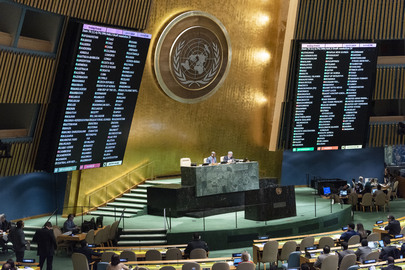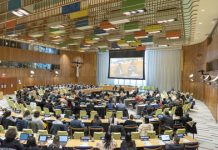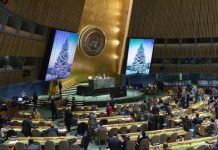Iran-Israel crisis: UN rights office issues appeal for urgent de-escalation
As the Iran-Israel crisis continued into a sixth day, the UN deputy human rights chief, Nada Al-Nashif, has called for urgent talks to end the ongoing missile exchanges between Tehran and Tel-Aviv.
Israel began targeting nuclear and military sites across Iran last Friday, prompting a barrage of retaliatory strikes on Israeli cities.
At the Human Rights Council in Geneva, Deputy High Commissioner Ms. Al Nashif expressed deep concern that populated areas had come under attack:
“There are serious concerns that some attacks are taking place in populated areas, with reports of civilian casualties. It is imperative that both sides fully respect international law, in particular by ensuring the protection of civilians in densely populated areas and of civilian objects.”
Latest reports from the region indicate that more than 200 people have been killed in Iran and 24 in Israel to date. The violence continued overnight in both countries.
In a related development, the UN-backed nuclear watchdog said on Wednesday that two Iranian centrifuge production facilities in Tehran and Karaj had suffered major damage after being targeted.
Nearly one in two Yemenis facing acute hunger
To Yemen, where one in two people living in Government-controlled areas face acute hunger.
The rapidly deteriorating food security situation already affects around five million people, and it is set to get worse between September 2025 and February 2026.
In an alert, UN-backed food security experts urged the immediate scale-up of humanitarian assistance to avoid any further deterioration.
Data from the Integrated Food Security Phase Classification platform shows that more than 1.5 million people are almost at the most extreme range of its hunger index.
Another 3.4 million are also extremely vulnerable, the result of a decade of civil war that has devastated the economy, displaced millions, and disrupted markets and livelihoods.
Global support for refugees holding firm
Turning to refugee support, two-thirds of people across 29 countries still support offering refuge to those in need.
That’s according to a new IPSOS survey released today in partnership with the UN refugee agency, just ahead of World Refugee Day on Friday.
40 per cent of respondents said they recognise the positive contributions refugees make to their host communities, with the US among the most supportive at 56 per cent.
But the survey also reveals a more complicated picture. 62 per cent believe most asylum-seekers are driven by economic opportunity, not fleeing danger.
That scepticism is feeding concerns around border security, with nearly half (49 per cent) saying their country should close its borders to refugees entirely.
Meanwhile, personal action to support refugees has dropped, from 38 per cent last year to just 29 per cent in 2025. Still, 62 per cent believe wealthier countries have a moral duty to help, with nations like South Korea and Türkiye calling for more responsibility from international organizations.
Anna O’Donnell, UN News
Music composed and produced by Joachim Harris. All rights reserved.
Source of original article: United Nations (news.un.org). Photo credit: UN. The content of this article does not necessarily reflect the views or opinion of Global Diaspora News (www.globaldiasporanews.com).
To submit your press release: (https://www.globaldiasporanews.com/pr).
To advertise on Global Diaspora News: (www.globaldiasporanews.com/ads).
Sign up to Global Diaspora News newsletter (https://www.globaldiasporanews.com/newsletter/) to start receiving updates and opportunities directly in your email inbox for free.






























